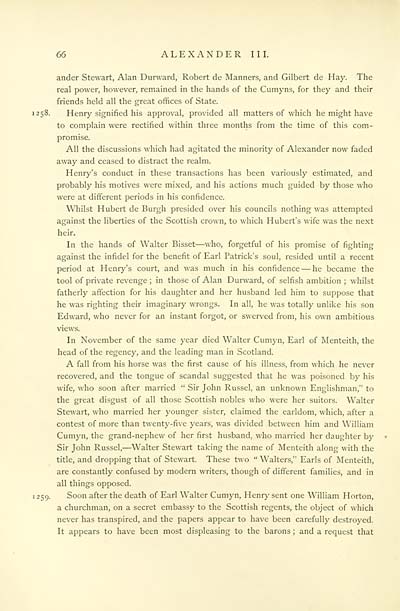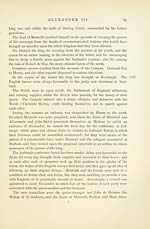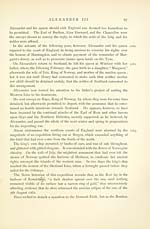Family records of the Bruces and the Cumyns
(78) Page 66
Download files
Complete book:
Individual page:
Thumbnail gallery: Grid view | List view

66 ALEXANDER III.
ander Stewart, Alan Durward, Robert de Manners, and Gilbert de Hay. The
real power, however, remained in the hands of the Cumyns, for they and their
friends held all the great offices of State.
1258. Henry signified his approval, provided all matters of which he might have
to complain were rectified within three months from the time of this com-
promise.
All the discussions which had agitated the minority of Alexander now faded
away and ceased to distract the realm.
Henry's conduct in these transactions has been variously estimated, and
probably his motives were mixed, and his actions much guided by those who
were at different periods in his confidence.
Whilst Hubert de Burgh presided over his councils nothing was attempted
against the liberties of the Scottish crown, to which Hubert's wife was the next
heir.
In the hands of Walter Bisset — who, forgetful of his promise of fighting
against the infidel for the benefit of Earl Patrick's soul, resided until a recent
period at Henry's court, and was much in his confidence — he became the
tool of private revenge; in those of Alan Durward, of selfish ambition ; whilst
fatherly affection for his daughter and her husband led him to suppose that
he was righting their imaginary wrongs. In all, he was totally unlike his son
Edward, who never for an instant forgot, or swerved from, his own ambitious
views.
In November of the same year died Walter Cumyn, Earl of Menteith, the
head of the regency, and the leading man in Scotland.
A fall from his horse was the first cause of his illness, from which he never
recovered, and the tongue of scandal suggested that he was poisoned by his
wife, who soon after married " Sir John Russel, an unknown Englishman," to
the great disgust of all those Scottish nobles who were her suitors. Walter
Stewart, who married her younger sister, claimed the earldom, which, after a
contest of more than twenty-five years, was divided between him and William
Cumyn, the grand-nephew of her first husband, who married her daughter by
Sir John Russel, — Walter Stewart taking the name of Menteith along with the
title, and dropping that of Stewart. These two " Walters," Earls of Menteith,
are constantly confused by modern writers, though of different families, and in
all things opposed.
1259. Soon after the death of Earl Walter Cumyn, Henry sent one William Horton,
a churchman, on a secret embassy to the Scottish regents, the object of which
never has transpired, and the papers appear to have been carefully destroyed.
It appears to have been most displeasing to the barons ; and a request that
ander Stewart, Alan Durward, Robert de Manners, and Gilbert de Hay. The
real power, however, remained in the hands of the Cumyns, for they and their
friends held all the great offices of State.
1258. Henry signified his approval, provided all matters of which he might have
to complain were rectified within three months from the time of this com-
promise.
All the discussions which had agitated the minority of Alexander now faded
away and ceased to distract the realm.
Henry's conduct in these transactions has been variously estimated, and
probably his motives were mixed, and his actions much guided by those who
were at different periods in his confidence.
Whilst Hubert de Burgh presided over his councils nothing was attempted
against the liberties of the Scottish crown, to which Hubert's wife was the next
heir.
In the hands of Walter Bisset — who, forgetful of his promise of fighting
against the infidel for the benefit of Earl Patrick's soul, resided until a recent
period at Henry's court, and was much in his confidence — he became the
tool of private revenge; in those of Alan Durward, of selfish ambition ; whilst
fatherly affection for his daughter and her husband led him to suppose that
he was righting their imaginary wrongs. In all, he was totally unlike his son
Edward, who never for an instant forgot, or swerved from, his own ambitious
views.
In November of the same year died Walter Cumyn, Earl of Menteith, the
head of the regency, and the leading man in Scotland.
A fall from his horse was the first cause of his illness, from which he never
recovered, and the tongue of scandal suggested that he was poisoned by his
wife, who soon after married " Sir John Russel, an unknown Englishman," to
the great disgust of all those Scottish nobles who were her suitors. Walter
Stewart, who married her younger sister, claimed the earldom, which, after a
contest of more than twenty-five years, was divided between him and William
Cumyn, the grand-nephew of her first husband, who married her daughter by
Sir John Russel, — Walter Stewart taking the name of Menteith along with the
title, and dropping that of Stewart. These two " Walters," Earls of Menteith,
are constantly confused by modern writers, though of different families, and in
all things opposed.
1259. Soon after the death of Earl Walter Cumyn, Henry sent one William Horton,
a churchman, on a secret embassy to the Scottish regents, the object of which
never has transpired, and the papers appear to have been carefully destroyed.
It appears to have been most displeasing to the barons ; and a request that
Set display mode to:
![]() Universal Viewer |
Universal Viewer | ![]() Mirador |
Large image | Transcription
Mirador |
Large image | Transcription
Images and transcriptions on this page, including medium image downloads, may be used under the Creative Commons Attribution 4.0 International Licence unless otherwise stated. ![]()
| Histories of Scottish families > Family records of the Bruces and the Cumyns > (78) Page 66 |
|---|
| Permanent URL | https://digital.nls.uk/95071922 |
|---|
| Description | A selection of almost 400 printed items relating to the history of Scottish families, mostly dating from the 19th and early 20th centuries. Includes memoirs, genealogies and clan histories, with a few produced by emigrant families. The earliest family history goes back to AD 916. |
|---|

